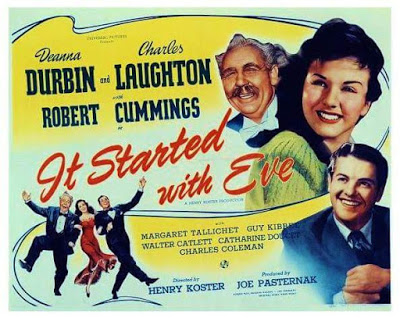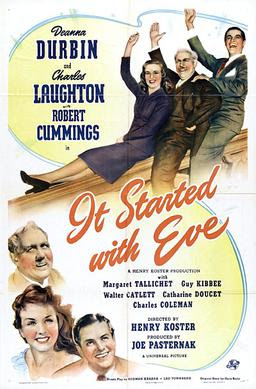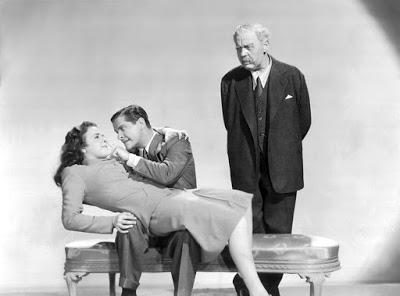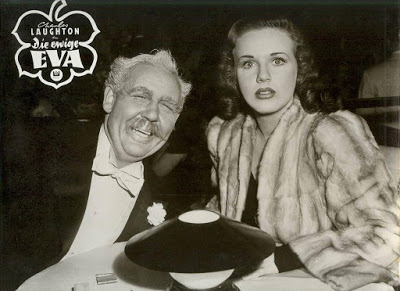It Started with Eve

Director: Henry Koster
Year: 1941
Rating: 8.0
Deanna Durbin had starred in eight films between her debut in Three Smart
Girls and this film and every one of them had been a big hit. America was
watching her grow up and in the real world she had just gotten married with
Garland, Rooney in attendance and her two "sisters" in Three Smart Girls
as bridesmaids. Universal was having to reflect this reality by putting her
in more grown up roles and Durbin was demanding it. By now she was also getting
$300,000 a film - not too bad for 1941. Or today for most of us. This film
was a nice move in that direction. She is an adult now - with her full figure
clearly signifying this. No pretending that she is a young girl any longer.
Universal under producer Joe Pasternak who was behind her first ten films
still kept to the same formula that had made her and her films so popular.
It is a mixture of comedy, music, a little drama and romance but this time
it is Durbin in the middle of the romance. It is all done wonderfully well
- basically a screwball comedy at light speed that is like an affectionate
purring cat. I have seen this same basic plot in a few other films but I
think this was the original one taken from a story by Hanns Kraly. The film
is directed by Henry Kostner, another one of the European ex-pats who had
left Germany when Hitler came to power. It was Pasternak who brought him
to Hollywood and Kostner was to direct six of Durbin's films. Basically,
Durbin films had their own unit they were so important to the studio.
Jonathan Reynolds is on his death bed and expected to pop off at any moment.
The press are keeping a death watch and have the front page ready to go and
two human vultures are waiting in the lobby of his mansion ready to make
a death mask. Reynolds is played by the fabulous Charles Laughton, never
more lovable than here as a gruff stubborn steak loving millionaire. He was
42 at the time playing a man much older and at times with his gnarly eye-brows
and bushy moustache he reminded me of a Muppet. His son Johnny (Bob Cummings)
rushes home from abroad to be at his bedside and tells his father not to
worry about him because he has a fiancé at the hotel. The father demands
to see her before he dies. Tonight. The son rushes to the hotel but his fiancé
is nowhere to be found and in a panic he grabs the hat check girl (Deanna)
as she goes off duty and convinces her with $50 to pretend to be his fiancé
for his father. In and out he promises her.
And so begins a marvelously amusing and sentimental comedy as the two of
them have to keep up the charade well beyond that first night as the old
man begins to get better. And he starts getting better as soon as he meets
Durbin. It makes sense if you know Durbin. She isn't a beauty by Hollywood
standards at the time - no svelte figure - but a very pleasing pretty face
that comes alive when she smiles or sings. Though a romance slowly percolates
between the son and Durbin as one expects (though Cummings is a bit of a
stick in the mud), the real romance - the true heart of the film - is between
Laughton and Durbin. They play off each other like synchronized swimming
as the old man tries to be a matchmaker once he figures out what is really
going on.
Durbin sings a few songs - all very low key with her at the piano and nothing
else. As I mentioned in my Three Smart Girls review - this was the difference
between her and Garland. Garland would have had a 20 piece orchestra accompanying
her. Universal keeps the song within the realm of the story (and their budget)
- Durbin's character has been trying to get a job singing with no success
and so on a few occasions she sings to herself or to Laughton. There were
actually two opportunities for the script to give her a big song - once at
a nightclub with a big band and once at a party where an orchestra is playing
but they eschew the chance. Another difference between Durbin and Garland
is their singing style and I think that has a lot to do with their enduring
legacy or lack of it. Garland is very commercial - jazz, pop - while Durbin
hits notes that Garland could only dream of but it is much more high brow
with her operatic styling. It clearly went over well back then but feels
out of time now while Garland is timeless.
Small parts to look for - Mantan Moreland as the train porter, John Hamilton
(Perry White) as the head waiter, Charles Coleman who I think made a career
out of playing butlers - as the butler as he was in Three Smart Girls and
in the party though I didn't spot him is John I Know Nothing Banner.




